| Srl | Item |
| 1 |
ID:
107774
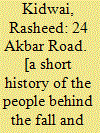

|
|
|
|
|
| Publication |
New Delhi, Hachette India, 2011.
|
| Description |
xv, 295p.
|
| Standard Number |
9789350090770, hbk
|
|
|
|
|
|
|
|
|
|
|
|
Copies: C:1/I:0,R:0,Q:0
Circulation
| Accession# | Call# | Current Location | Status | Policy | Location |
| 056267 | 324.254/KID 056267 | Main | On Shelf | General | |
|
|
|
|
| 2 |
ID:
170120
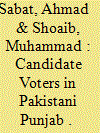

|
|
|
|
|
| Summary/Abstract |
Candidate voters are a significant percentage of the electorate in Pakistani Punjab. Consideration of the last three National Assembly elections shows a consistent attitude: Punjabi voters care more about candidates than they do about political parties. Political parties attract voters in urban districts, but they rely on “electables” (candidates with strong personality and loose party affiliation) in semi-urban and rural districts.
|
|
|
|
|
|
|
|
|
|
|
|
|
|
|
|
| 3 |
ID:
129287


|
|
|
| 4 |
ID:
107913


|
|
|
|
|
| Publication |
2011.
|
| Summary/Abstract |
This study examines the effect of electoral victory in 1988 and electoral defeat in 1992 on the party organization structure of Israel's Likud Party. Until recently, most researchers on party organization claimed that electoral defeat causes organizational change, while other scholars found that victory, too, can generate change in party organization. The present article studies the effects of electoral defeat versus electoral victory on party organization. Findings reveal that, following victory, the Likud became more factional, with intra-party power struggles, leading to a more equal distribution of power. Electoral defeat changed the dominant coalition and leadership, resulting in a more oligarchic structure.
|
|
|
|
|
|
|
|
|
|
|
|
|
|
|
|
| 5 |
ID:
151234
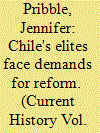

|
|
|
|
|
| Summary/Abstract |
The challenge for Chile is to ensure that policy making and governance are democratized further.
|
|
|
|
|
|
|
|
|
|
|
|
|
|
|
|
| 6 |
ID:
104587
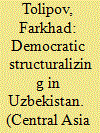

|
|
|
| 7 |
ID:
091364


|
|
|
| 8 |
ID:
171351
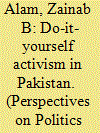

|
|
|
|
|
| Summary/Abstract |
In July 2016, Pakistani social media celebrity Qandeel Baloch was asphyxiated by her brother and gained posthumous celebrity in the West where her death was sensationally categorized as an honor-killing. Yet Qandeel was a celebrity in her own right among South Asians long before her death. Through skillful use of social media, she created new forms of public space and used them to challenge dominant social norms and political practices. I examine Qandeel’s “do-it-yourself activism”—her innovative use of the digital public sphere to position herself as a worthy representative of Pakistani nationality; to critique long-established norms governing gender, class, and sexuality; and to expand the boundaries of national belonging in Pakistan to include culturally rebellious women of limited economic means. By examining Qandeel’s audacious means of standing for Pakistan, her deployment of marriage proposals as a mode of subversive political activism within the political party, Pakistan Tehreek-e-Insaf (Pakistan Movement for Justice, PTI), and her use of visual culture (“selfies”) to challenge the moral authority of a powerful Islamic cleric, I theorize a form of political activism grounded in women’s agency that deploys celebrity to illuminate and politicize injustices.
|
|
|
|
|
|
|
|
|
|
|
|
|
|
|
|
| 9 |
ID:
078593
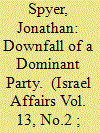

|
|
|
| 10 |
ID:
064844


|
|
|
| 11 |
ID:
106452


|
|
|
|
|
| Publication |
2011.
|
| Summary/Abstract |
When political parties organize, compete and maintain interests at different levels, they bring interconnections both between as well as horizontally across levels. This study suggests that the autonomy of state politics formulation may have to pay greater attention to the federal framework and give more consideration to the role of polity-wide parties. This study uses the autonomy thesis as a heuristic tool and expands the discussion beyond state politics as considered by Yogendra Yadav-Suhas Palshikar. It examines the interface between the rise of the state as the primary unit and the functioning of political parties, especially in a multi-party competitive scenario where parties are forced to enter into coalitions. By situating India and its coalition experiences within a broader literature of comparative politics, the study tries to enrich our understanding about the relationship between federalism, political parties and coalition politics.Government
S
|
|
|
|
|
|
|
|
|
|
|
|
|
|
|
|
| 12 |
ID:
125076
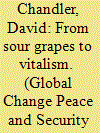

|
|
|
|
|
| Publication |
2013.
|
| Summary/Abstract |
He does not spend too much time on drawing the links with Operaismo/Workerism as a post- 1956 reaction against the Italian Communist Party (PCI), especially in the theoretical and political work around the time of Quaderni Rossi ('Red Notebooks', 1961-65), Classe Operaia ('Working Class', 1963-66) and the organization Potere Operaio, or the generalization of anti-party calls for self-activity beyond the mass factory to the 'social factory' in the Italian autonomist movements of the 1970s. Some background would have allowed readers to appreciate how the shift from workerism in the 1960s to the autonomia/autonomist movement of the late 1970s, enabled the Italian Left to give 1968 student lifestyle radicalism a Marxist makeover: rather than an individualist, student-centred understanding of the world, workers in everyday life and struggle made the world and provided the life-giving creative vital forces which capitalism sought to be both parasitical upon and to artificially contain. Here sociology was the key discipline of critique: blurring the political/economic divide of Stalinist determinism and rejecting the party's possession of 'objective' understandings of economic bases, structures and contradictions.
|
|
|
|
|
|
|
|
|
|
|
|
|
|
|
|
| 13 |
ID:
120985


|
|
|
|
|
| Publication |
2013.
|
| Summary/Abstract |
This article analyses the relationship between violence, the transition from apartheid, and contemporary state formation in South Africa. Through an ethnographic case study of the rural area of Umbumbulu outside Durban in KwaZulu-Natal, the article argues that prevailing interpretations of violence that focus on rivalry between political parties obscure the ways in which other factors - such as local power struggles among customary leaders and strongmen, state support for the rise of warlords, and the recruitment of young men through kinship and patronage networks - helped spread the violence. Local strongmen or warlords were motivated by the quest for power and economic success in their local communities as well as their beliefs in and strategic alliances with national-level political parties engaged in the struggle to end apartheid. In particular, the article focuses on a 'faction fight' in the mid-1980s and the subsequent violence that surrounded two warlords affiliated to the African National Congress in a region that was mostly dominated by Inkatha supporters. The alliances the ANC made with these warlords continued into the post-apartheid period and helped shape the ways in which power was exercised within the new political institutions of the democratic state.
|
|
|
|
|
|
|
|
|
|
|
|
|
|
|
|
| 14 |
ID:
085112


|
|
|
|
|
| Publication |
2008.
|
| Summary/Abstract |
Richard M. Skinner challenges notions that the strong presidency of the modern era has proved incompatible with powerful political parties. Instead, he argues that, since 1980, the United States has seen a dramatic growth in presidential partisanship across a range of areas.
|
|
|
|
|
|
|
|
|
|
|
|
|
|
|
|
| 15 |
ID:
120595
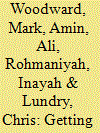

|
|
|
|
|
| Publication |
2013.
|
| Summary/Abstract |
Partai Keadilan Sejahtera (PKS, The Justice and Prosperity Party) is the largest Islamist political party in Indonesia. It has roots in the religious and political and religious teachings of the Muslim Brotherhood and promotes what Oliver Roy calls "deculturized religion." The party can be understood as the political component of a larger social movement that seeks to transform Indonesian society and culture in ways that would establish Shari'ah as social, if not political, reality. It is also committed to the electoral process and to working inside the Indonesian political system in a more general sense. Until recently, the PKS has dismissed local modes of Muslim practice and much of Indonesian culture as "un-Islamic." The extent of the party's transformative agenda is unclear for three reasons: it shares the Muslim Brotherhood's gradualist approach, it is less than transparent about its goals, and it is divided into purist or "Justice" and pragmatic or "Prosperity" factions. The leadership of the Prosperity faction is currently ascendant and is attempting to reach beyond its Islamist base by sponsoring musical and dramatic performances it hopes will appeal to Muslims devoted to Javanese and other Indonesian cultural traditions. Ethnographic and web-based research indicate that these efforts are greeted with considerable suspicion.
|
|
|
|
|
|
|
|
|
|
|
|
|
|
|
|
| 16 |
ID:
127956
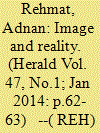

|
|
|
| 17 |
ID:
162025
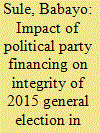

|
|
|
| 18 |
ID:
150244
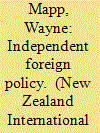

|
|
|
| 19 |
ID:
167396
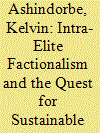

|
|
|
|
|
| Summary/Abstract |
The People’s Democratic Party was the governing party for 16 years until it was defeated in the 2015 general elections. The dominance of the party over the Nigerian political landscape masked the deep internal schism that has bedevilled the party since its formation. This paper traced the origin of the protracted internal conflicts in the party to its formation process, accentuated by the prebendal character of the Nigerian state. A collection of political grandees assembled in the party without a well-articulated vision for governance other than take hold of political power and the resultant patronage accruable from occupying public office. Conflicts in the party manifest in several dimensions, namely: suspension or expulsion of party members, protracted litigation, formation of parallel party structure, defections to rival parties, verbal and physical assault of members. This pattern of conflicts weakened internal cohesion and distracted those elected from the task of actualizing their campaign promises. The methodology is qualitative, primary data sourced from party members is complemented with data from secondary sources. The paper concluded that the ultimate losers from the internal fights in the party are the citizens who suffered the effects in the form of unfulfilled electoral promises.
|
|
|
|
|
|
|
|
|
|
|
|
|
|
|
|
| 20 |
ID:
111167


|
|
|